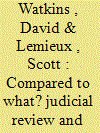|
|
|
Sort Order |
|
|
|
Items / Page
|
|
|
|
|
|
|
| Srl | Item |
| 1 |
ID:
140201


|
|
|
|
|
| Summary/Abstract |
Many democratic and jurisprudential theorists have too often uncritically accepted Alexander Bickel's notion of “the countermajoritarian difficulty” when considering the relationship between judicial review and democracy; this is the case for arguments both for and against judicial review. This framework is both theoretically and empirically unsustainable. Democracy is not wholly synonymous with majoritarianism, and judicial review is not inherently countermajoritarian in the first place. In modern democratic political systems, judicial review is one of many potential veto points. Since all modern democratic political systems contain veto points, the relevant and unexplored question is what qualities might make a veto point relatively democratic. Proceeding on the assumption that democracy's primary normative value is found in its opposition to domination by both state and private actors, we make a preliminary effort to delineate what qualities a democratic veto point might have, identifying five criteria, and evaluate judicial review using these criteria. We conclude that judicial review's performance against these criteria is decidedly mixed, but in the final balance is likely to be a modest net positive for democracy, particularly when compared to other veto points commonly found in contemporary democratic political systems.
|
|
|
|
|
|
|
|
|
|
|
|
|
|
|
|
| 2 |
ID:
110552


|
|
|
|
|
| Publication |
2011.
|
| Summary/Abstract |
Democracy is about including those who are potentially affected by collective decisions in making those decisions. For this reason, contemporary democratic theory primarily assumes membership combined with effective voice. An alternative to voice is exit: Dissatisfied members may choose to leave a group rather than voice their displeasure. Rights and capacities for exit can function as low-cost, effective empowerments, particularly for those without voice. But because contemporary democratic theory often dismisses exit as appropriate only for economic markets, the democratic potentials of exit have rarely been theorized. Exit-based empowerments should be as central to the design and integrity of democracy as distributions of votes and voice, long considered its key structural features. When they are integrated into other democratic devices, exit-based empowerments should generate and widely distribute usable powers for those who need them most, evoke responsiveness from elites, induce voice, discipline monopoly, and underwrite vibrant and pluralistic societies.
|
|
|
|
|
|
|
|
|
|
|
|
|
|
|
|
| 3 |
ID:
118974


|
|
|
|
|
| Publication |
2012.
|
| Summary/Abstract |
Democratic theory is often portrayed as torn between two moments: that of disruption of rule, and the ordinary, ongoing institutionalization of politics. This dualism also marks contemporary democratic theory. In Jacques Rancière's theory of politics it takes the form of an emphasis on the ruptural qualities of the staging of novel democratic demands and the reconfiguration of the space of political argument. The reconfiguration of existing political imaginaries depends upon a moment of inscription, which remains underdeveloped in Rancière's work. Arguing that the possibility of inscription is indeed thematized in Rancière's more historical writings, but is often ignored by commentators, this article seeks to draw out the implications of a focus on inscription for democratic theory and practice. To flesh out this account, the article draws on Cavell's writings on exemplarity and the role of exemplars in fostering both critical reflection and the imagination of alternatives. The focus on such exemplars and an aversive, nonconformist ethos together facilitate a better understanding of what is required for such novel demands to be acknowledged and inscribed into democratic life.
|
|
|
|
|
|
|
|
|
|
|
|
|
|
|
|
|
|
|
|
|